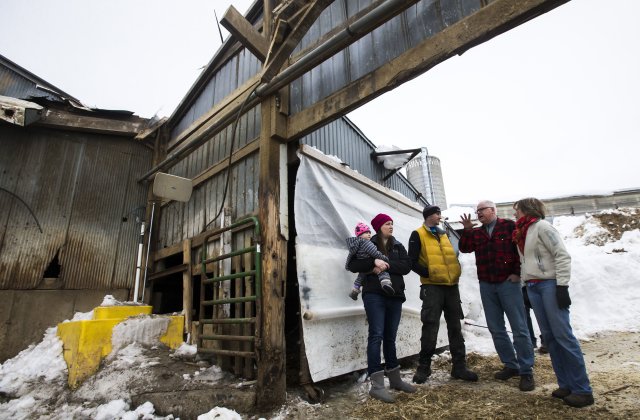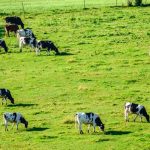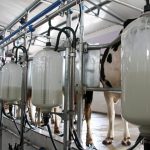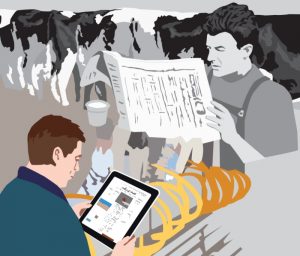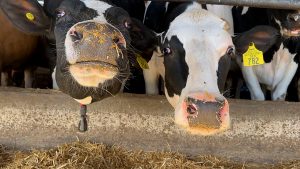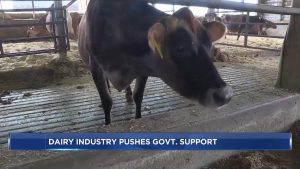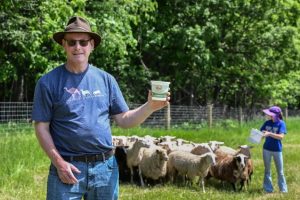
MINNEAPOLIS — COREY Hoffman, a fourth-generation dairy farmer in Chatfield, Minnesota, talks about Feb. 26: “I can tell everybody one thing: We didn’t have to go to anybody’s funeral. That’s the number one thing, but that Tuesday was the worst day of our lives.” That’s the day the second portion of his barn’s roof collapsed after the first collapsed on Feb. 23. He and his wife, Bridget, had to sell their 361 cows, save for the 13 that perished in the ordeal.
“We had employees in the barn (when it collapsed the second time) and at that point we were done; it was the only thing we could do. It wasn’t safe. We had to sell the cows and get them out of there and not have employees in the barn,” Hoffman says, finding solace in the fact that a friend in Lake City, Minnesota, was able to take the cows so he knows they’ve gone to a good home.
Ask any Minnesotan: This winter has been a brutal one, but particularly so for dairy farmers like the Hoffmans. The weight of February’s record snowfalls caused the roofs of 45 farm buildings across the state to collapse, according to a running list that Lucas Sjostrom, the executive director of the Minnesota Milk Producers Association, is keeping.
“I’m guessing that there are five to 10 more that I don’t know about. What happened to these 45 or 50 farms isn’t one little thing that ruins a business plan, it’s a huge thing that decimates your business plan,” Sjostrom says.
To address the toll that this winter’s snow has taken on Minnesota farmers, legislation that has come to be known as the “Save our Farms” bill unanimously flew through the Minnesota House and Senate last week, culminating in Gov. Tim Walz’s signing it into law on Monday.
The bill expanded the state’s Disaster Loan Recovery Program to include uninsured losses incurred from the weight of snow, sleet or ice and retroactively dates back to Jan. 1. “Farmers are resilient, but sometimes they need just a little relief when Mother Nature wreaks her havoc,” state Sen. Mike Goggin (R-Red Wing), the author of the Senate bill, told the Winona Daily News.
“We have some insurance, but the legislation will be very helpful in making up some of the holes that the insurance didn’t cover or couldn’t cover,” says Dave Brutscher, a dairy farmer whose roof also collapsed. He has begun reconstruction on his barn north of St. Cloud thanks to the contractors he has longstanding relationships with who are willing to begin work even while Brutscher is temporarily unable to pay.
While Brutscher and the Hoffmans are grateful for the assistance the government was able to put together, they cite the support they’ve received from their communities as supremely meaningful. “Once the word got out that (my roof had collapsed), the phone never stopped ringing with offers of help and people coming with equipment. People offered to help care for our cows at their farm for no cost,” Brutscher says.
Thom Petersen, the newly minted commissioner of the Minnesota Department of Agriculture, is pleased with the outcome of the “Save our Farms” bill.
“With our Democratic House and Republican Senate, we’re a divided state. This is a first time in a long time that this has happened in the U.S.,” he says, referring to there being just one state with a divided legislature. The last time that happened was 105 years ago. “(Unanimously passing) a bill like this is what gives me hope. You know what they say, in disasters people come together,” he says, optimistic that this is a sign of what’s to come as the legislature tackles the state budget in the coming months.
Both Petersen and Sjostrom believe that there’s more to be done to help farmers. “We can’t say enough that this (legislation) is great and it should have already been there, but it doesn’t get to the larger problem of tough years,” Sjostrom says.
The Minnesota Milk Producers Association is lobbying for HF 1418 and SF 1698, legislation that would help pay the premiums required for dairy farmers to enroll in the federal farm bill program designed to help mitigate the costs small dairy farmers incur when the price difference between what farmers pay for feed and what they get for milk passes a certain point.
While relief in prices is forecasted for later this year, prices for commodities such as dairy have been down for the past five years. Sjostrom’s organization is focused on getting dairy farmers through the next 12 months in order to reap those higher prices – no small task considering that Minnesota lost 140 dairy farms in 2018 alone because of an inability to survive continually slumping prices.
These crippling circumstances underscore the issue of mental health in the farming industry.
Petersen explains that he’s been working on another bill – HF 232, which passed the house and is currently in the Senate – that’s designed to increase counseling and mental health resources for farmers.
“We’re worried about farmers having a lot of stress. We’ve (already) had two suicides this year. We want to avoid that,” he says. Currently there is just one mental health counselor who works with farmers for the whole state. This legislation would double that number.
Sjostrom tells the story of one farmer who reached out to him explaining that he had to make a decision between paying the bill for his cows’ hay or paying his insurance. He opted for the former and then a few weeks later his barn collapsed, damaging machinery within it. “Even with resources, what’s engrained in a farmer is not to go out and ask for help. We’re a stubborn bunch of people. … but struggling to find optimism in this,” Bridget Hoffman says.
“My biggest fear is if (farmers) are in a mental state to do something to harm themselves,” Sjostrom says, adding that he plans to call the affected farmers he knows in the coming weeks to see if they’re all right.
Petersen hopes that the laws working their way through the Minnesota Legislature signal to the state’s farmers that they’re important. He visited several of the farms affected by this winter’s heavy snow, and “it’s tough on them,” he notes. “Just having someone to talk to is important. I think a lot of them were overwhelmed by the support they got from their communities. It shows how important it is to them.”
